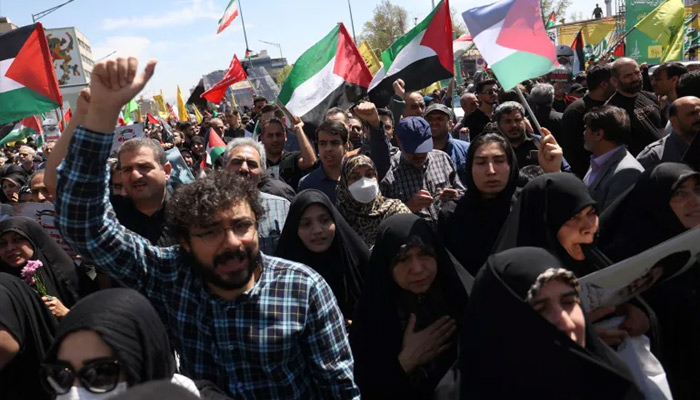In an unexpected turn of events, the overseas Iranian diaspora appears to be condemning their country’s Islamic rulers for launching an unprecedented attack on Israel over this weekend, which the UN says has pushed the Middle East to “the brink” of a full-scale conflict.
Iranian expats living in Western countries like the United States, Canada and Germany on Monday started a social media trend with the hashtag #IraniansStandWithIsrael.
Iran’s attack on Israel
Iran and Israel have been fighting a shadow war for years, but on April 13, the conflict took a dangerous turn when the Islamic Revolutionary Guards Corps (IRGC) launched an unprecedented missile and drone attack on the Jewish state.
The IRGC, the elite forces loyal to Iran’s Islamic regime, carried out the attack in response to an attack on Iran’s consular annex in the Syrian capital Damascus on April 1, which killed several commanders, including Mohammadreza Zahedi, the IRGC’s chief official in the Levant region. The attack on Israel was aided by missile fire by Iran-supported militia groups in Yemen and Lebanon.
Campaign against Khomeini regime
The social media campaign, primarily focused on X (formerly Twitter), condemned IRGC for its actions in the region.
A comprehensive assessment of social media interactions, including posts and trending hashtags among the Iranian diaspora on platform X, reveals a significant volume of content demonstrating a critical stance against Iran’s autocratic regime and expressing solidarity with Israelis.
Many participants equated the IRGC’s attack with war on the Iranian people.
“I had the opportunity to amplify the voice of the People in Iran: #IraniansStandWithIsrael. This is not the war of the Iranian people, it is an attack from the Islamic Republic,” writes one user.
Data from social media analytics sites show many Iranians staying within the country also joined the campaign, posting commentary with hashtags #IraniansStandWithIsrael and #FreeTheWorldFromIRGC. As per Talkwalker, about 40 per cemt of 1,000 posts carrying #IraniansStandWithIsrael campaign hashtag originated from Iran, 54.4 per cent from the US, and 3.2 per cent from the UK.
Hashtag #FreeTheWorldFromIRGC accumulated 3,500 posts in the last seven days, with 47.5 per cent of participants from Iran, 37.3 per cent from the US, and 6.6 per cent from Germany. Both hashtags, critical of the Iranian regime, were promoted by the same group of users.
In a video shared by Iranian activist Salman Sima, people can be seen holding a protest in Canada against the Khomeini regime. Protesters held banners proclaiming “Iranians stand with Israel.” The activist also urged the Canadian government to designate the IRGC as a terrorist organisation.
Salman’s Facebook profile indicates he is originally from Zanjan, Iran, and relocated to Toronto after escaping imprisonment, torture, and hunger strikes in Iran.
“We don’t want war with Israel,” said another Iranian activist living in the US.
In Germany’s Hamburg, protesters held rallies displaying banners with the hashtag #IRGCterrorists, echoing support for Israel and opposing the Islamic authorities in Iran. There are also reports of rallies being held in Paris in solidarity with Israel.
Previously, Israel and Iran had been engaged in a years-long shadow war – attacking each other’s assets without admitting responsibility. Those attacks have ratcheted up considerably during the current war in Gaza sparked by the Palestinian group Hamas’s assault on nearby Israeli communities last October.
Why are Israel and Iran fighting?
The two countries had friendly diplomatic relations until the 1979 Islamic revolution in Iran, which ushered in a regime that has used opposing Israel as a key part of its ideology. Iran does not recognise Israel’s right to exist and seeks its eradication.
Ayatollah Ali Khamenei, Iran’s supreme leader, has previously described Israel as a “cancerous tumour” that “will undoubtedly be uprooted and destroyed.” Israel perceives Iran as an existential threat, citing Tehran’s inflammatory rhetoric, its support for proxy forces that vow to destroy Israel, and its funding and arming of Palestinian groups like Hamas, as well as the Lebanese Shia militant group Hezbollah.

